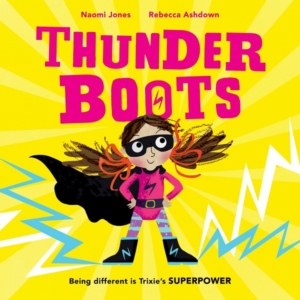
Dyslexia and Me
Author Naomi Jones describes how being dyslexic has affected her life and her writing.
I have always loved stories. As a child I learnt to read early and I would stay up late reading under my duvet with a torch. I always looked forward to trips to the library to choose new books and began writing my own stories and poems in earnest from the age of seven. I used to love, and still do, playing with language and words and making up characters and worlds.
I had no idea at secondary school that I might be dyslexic. I’d always done well academically although looking back I can see that I’d just developed strategies to help me in the areas I struggled with. I wrote copious notes when the teachers talked during lessons as I couldn’t retain the information otherwise. I used mind maps to help me revise and I also used to look up the marking schemes for exams at school to see how many marks I’d lose for my poor spelling. It was a real struggle to make my handwriting legible, especially in tests!
 It was when I started my English Degree at Nottingham University that my undiagnosed dyslexia caught up with me. I found it really hard to keep up with reading all of the academic texts – I have always been a fast reader, but this is partly because my eyes skip when reading and I don’t read all the words. If I have to read every word on a page, I literally have to put a ruler or a finger under each line to try to pin the words down and it takes aaaggggeeees. I could hold my own in seminars and knew my ideas had value, but couldn’t seem to structure or write essays in a way that was getting me the marks I knew I deserved. I felt like I was working twice as hard as my peers and still getting lower marks. It was incredibly frustrating.
It was when I started my English Degree at Nottingham University that my undiagnosed dyslexia caught up with me. I found it really hard to keep up with reading all of the academic texts – I have always been a fast reader, but this is partly because my eyes skip when reading and I don’t read all the words. If I have to read every word on a page, I literally have to put a ruler or a finger under each line to try to pin the words down and it takes aaaggggeeees. I could hold my own in seminars and knew my ideas had value, but couldn’t seem to structure or write essays in a way that was getting me the marks I knew I deserved. I felt like I was working twice as hard as my peers and still getting lower marks. It was incredibly frustrating.
My mum was a primary teacher growing up and always said she thought she might be dyslexic. Looking back, she was sure her dad, my Grandpa, was severely dyslexic. So when I started to struggle at University, I went and spoke to Student Services who arranged for me to be assessed by an Educational Psychologist. I got my dyslexia diagnosis at the age of twenty-one. It helped me make sense of so many things – my appalling sense of direction, why I got my left and right mixed up learning to drive and why I sometimes get words muddled up.
One of the first people I told about my diagnosis was my housemate. I still remember what she said, ‘Oh, but you’re not stupid at all.’ It hit me then how there is still a perception that people with dyslexia are less intelligent when this simply isn’t true. We just live in a world that judges academic success based on a specific way of thinking.
Estimates suggest that 10% of the population are dyslexic and amongst that 10%, there is a huge spectrum of ways that dyslexia affects people. My experience of dyslexia will not be the same as anyone else’s, but I do think that just like Trixie learns in my new book Thunderboots, thinking differently is actually a superpower. Dyslexia allows me to see things differently and make connections that others might not make. I’m not afraid of making mistakes or re-writing my work, over and over and over again, because I’ve always had to do that. You won’t see the mistakes I make while writing this because I will correct them and very carefully proofread it, but as I type this, my word document is littered with words underlined in red.
Some people might think that being dyslexic would be challenging for a writer and in some ways I do have to work harder than others might. But I also think my dyslexia is a gift precisely because it helps me see the world differently. One of the things I’ve always loved about stories is that they allow you to step into someone else’s shoes and experience life the way they do, just for a little while. This is why it’s so important for children to see diversity in the books they read, both in terms of characters and themes as well as seeing diversity in the creators of the books themselves.
I am really proud of my new book Thunderboots. It is about a girl named Trixie who is excited to start school but struggles when she finds some things harder than her peers. The truth is, we are all good at different things and I hope that readers take that message away from this story as well as the importance of celebrating your strengths. Thunderboots was my Grandpa’s nickname for me when I was little. This book has been illustrated by Rebecca Ashdown whose husband and daughter are also dyslexic and I know it means a lot to us both.
Naomi Jones is a poet and children’s author. Her published picture books include The Perfect Fit, One More Try, The Odd Fish, How to Catch a Rainbow, How to Make a Story and Thunderboots. Her work has now been translated into 19 languages.
You can follow Naomi on Instagram @naomiandjamesjones and on Twitter @NaomiJones_1
Thunderboots written by Naomi Jones, illustrated by Rebecca Ashdown, is published by Oxford University Press, £7.99 pbk.




